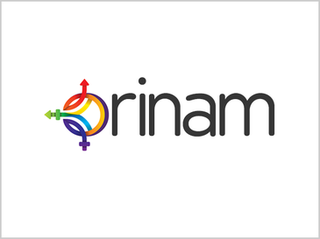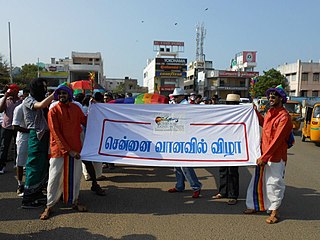Related Research Articles
Homosexuality in India has been a subject of discussion from ancient times to modern times. Hindu texts have taken various positions regarding homosexual characters and themes. The ancient Indian text Kamasutra written by Vātsyāyana dedicates a complete chapter on erotic homosexual behaviour. Historical literary evidence indicates that homosexuality has been prevalent across the Indian subcontinent throughout history, and that homosexuals were not necessarily considered inferior in any way until about 18th century during British colonial rule.
Pedro Julio Serrano is an openly gay and HIV+ human rights activist and president of Puerto Rico Para Todes, a non-profit LGBTQ+ and social justice advocacy organization founded in 2003. He is a former advisor to former New York City Council Speaker Melissa Mark Viverito and to former San Juan Mayor Carmen Yulín Cruz. He also served, for more than three years, as executive director of Programa Vida and Clínica Transalud of the Municipality of San Juan. He now works as Director of Public Affairs at Waves Ahead.

This article provides an overview of the development of LGBTQIA+ representation, as well as rights of the community, in modern day Turkey. In addition, it addresses their contribution and struggles as well as the coalitions they have built from the Abolition of the Caliphate times until the 21st century.
Pune Pride is an annual LGBT pride parade that was first held in Pune, Maharashtra on 11 December 2011. It is the second Pride parade to be organized in the state of Maharashtra, after the Queer Azaadi Mumbai Pride March.

India has a vibrant LGBTQ culture, especially in its large cities due to growing acceptance in the recent years.
Queer Azaadi Mumbai Pride March, also called Queer Azaadi March and Mumbai pride march, is an annual LGBTQIA pride parade that is held in the city of Mumbai, capital of Maharashtra, India. It usually begins from Gowalia Tank ending at Girgaum Chowpatty. It, along with the Pride Week, is organized by Queer Azaadi Mumbai, a collective of organizations and individuals working for the rights of LGBTQIA community. The participants of the march include people from the LGBTQIH community as well their "straight allies", from India and outside. In addition to being a celebration of queer pride, the pride march and related events are a platform to ask for equal rights.

Delhi Queer Pride Parade is organised by members of the Delhi Queer Pride Committee every last Sunday of November since 2008. The queer pride parade is a yearly festival to honour and celebrate lesbian, gay, bisexual and transgender people, and their supporters. The parade usually runs from Barakhamba Road to Tolstoy Marg to Jantar Mantar.

Houston has a large and diverse LGBT population and is home to the 4th largest gay pride parade in the nation. Houston has the largest LGBT population of any city in the state of Texas.
Chennai has LGBTQIA cultures that are diverse concerning- socio-economic class, gender, and degree of visibility and politicisation. They have historically existed in the margins and surfaced primarily in contexts such as transgender activism and HIV prevention initiatives for men having sex with men (MSM) and trans women (TG).

Queer Pride Guwahati was organised for the first time by the members and supporters of the local LGBT community in Guwahati, Assam on 9 February 2014. The Queer Pride Guwahati was the first LGBT Pride in the entire North Eastern India. The Pride is expected to become an annual event.

Orinam is a non-funded, social, and activist collective that works to enhance understanding of alternate sexualities and gender identities among families, communities and society. It was founded in 2003 in Chennai under the name MovenPick and is one of the oldest collective of its kind in India. People affiliated with Orinam are from or trace their ancestry to the following geo-cultural: People of Tamil Origin from Tamil Nadu, India. Orinam provides a platform for creative expression, personal and social commentary by Queer people of Tamil Origin and of Indian Origin primarily. Orinam also acts as a local support group in Chennai for the queer community. Orinam also partners with the city-, state- and national initiatives around decriminalisation of homosexuality by amending Section 377 of the Indian Penal Code and LGBTQ rights.

The Chennai Rainbow Pride March has been held by members of Tamil Nadu LGBTIQA+ communities every June since 2009. The pride march is organised under the banner Tamil Nadu Rainbow Coalition, which is a collective of LGBT individuals, supporters, and organizations working on human rights and healthcare for the LGBTQIA community. The Pride March occurs on the final Sunday of June every year. The Pride March is usually preceded by a month-long series of events organized by NGOs and organizations to inculcate awareness and support for the LGBTQ community, such as panel discussions, film screenings, and cultural performances. The Chennai Vaanavil Suyamariyadhai Perani a.k.a. Chennai Rainbow Self-Respect March is known for being inter-sectional in nature as it addresses issues with multiple axes such as caste, class, religion coupled with gender discrimination.

Lesbian, gay, bisexual and transgender (LGBT) people in Kerala face legal and social difficulties not experienced by non-LGBT persons. However, Kerala has been at the forefront of LGBT issues in India after Tamil Nadu. It became one of the first states in India to establish a welfare policy for the transgender community and in 2016, proposed implementing free gender affirmation surgery through government hospitals. However, there is rising homophobic sentiment in the state recently due to anti-LGBT campaigns spearheaded by Muslim fundamentalist groups like Indian Union Muslim League, Samastha and Jamaat-e-Islami.

The National Pride March, also known as the Equality March for Unity and Pride and LGBT Resist March, occurred on June 11, 2017, in conjunction with Washington, D.C.'s annual pride parade, Capital Pride. The event was organized by New York gay activist David Bruinooge. By late January 2017, more than 50,000 people had expressed interest in attending the event on its Facebook page. The march also commemorated the 49 victims of the 2016 Orlando nightclub shooting.
Kolkata Rainbow Pride Walk (KRPW) is the oldest pride walk in India and South Asia. The first march in Kolkata was organised on 2 July 1999. The walk was called The Friendship Walk. Kolkata was chosen as the first city in India to host the march owing to Kolkata's history of movements for human and Political Rights. Currently, Kolkata Rainbow Pride Walk is organised by the Kolkata Rainbow Pride Festival (KRPF).
The Chandigarh LGBTQ Pride Walk is an annual march held as part of the "Garvotsava" pride week celebrations in Chandigarh, the capital city of the northern Indian states of Punjab and Haryana. The event aims to celebrate and bring together the LGBTQ community and its supporters.
Hyderabad Queer Pride has been celebrated on one of the Sundays in February since 2013. First held on 3 February 2013, Hyderabad became the 12th Indian city to join the Queer pride march bandwagon, fourteen years after the first Indian pride march was held in Kolkata. In 2015 it was renamed as Hyderabad Queer Swabhimana Pride, emphasising the self-respect and the acceptance of the community of themselves, as they are. In 2016 it was altered to Hyderabad Queer Swabhimana Yatra and has been retained since.
Bengaluru Namma Pride March is a queer pride march that is held annually in the city of Bengaluru in Karnataka, India, since 2008. The march is organised by a coalition called Coalition for Sex Workers and Sexuality Minority Rights (CSMR). The pride march is preceded by a month of queer related events and activities

Orange City LGBT Pride March or Nagpur Pride Parade is the pride march organised annually in Nagpur, Maharashtra. It was started in the year 2016. It is a festival to honour and celebrate Lesbian, Gay, Bisexual and Transgender people and their supporters.
Bhubaneswar, the capital city of Odisha, India, held its first Pride Parade on 27 June 2009. Since then Pride has happened in 2010 and then again in 2018. Hundreds of people from Bhubaneshwar, Cuttack and other parts of Odisha take to the streets to celebrate the city's LGBTQ+ Pride Parades.
References
- ↑ "Gurgaon ready to host its first queer pride parade - Times of India". The Times of India. Retrieved 17 June 2017.
- ↑ "In pictures: Gurugram celebrates its first-ever LGBTIQ pride march". CatchNews.com. Retrieved 17 June 2017.
- ↑ "Gurgaon citizens witness first-ever LGBT pride parade in the city". www.merinews.com. Archived from the original on 30 June 2018. Retrieved 30 June 2018.
- ↑ Barthwal, Aditya (3 July 2016). "LGBT Pride Parade – Ab Gurgaon Dur Nahin!". Campus Drift. Archived from the original on 12 July 2016. Retrieved 17 June 2017.
- ↑ "Why Gurgaon Is Having A Queer Pride This Year". 22 June 2016.
- ↑ "Gurgaon Will Host Its First LGBTQ Pride Parade This Evening". indiatimes.com. Retrieved 17 June 2017.
- ↑ "Mass shooting at Orlando nightclub". 20 June 2016. Retrieved 17 June 2017.
- ↑ "Orlando Shooting". The New York Times. Retrieved 17 June 2017.
- ↑ "Gurgaon pride love diversity".